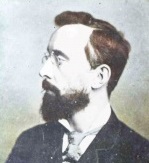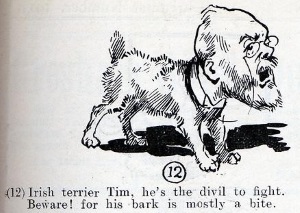Tim Healy first Governor General of Ireland
Published on 12th October 2019
 On December 6, 1922, the Irish Free State came formally into existence after the Free State Act gave effect to the Anglo-Irish Treaty. It was exactly one year after the signing of the Treaty. Under the Free State Act, the Governor General would be the King’s representative in Ireland. The first holder of the post was former Irish Parliamentary Party MP Timothy Healy, who was sworn in at his home in Chapelizod.
On December 6, 1922, the Irish Free State came formally into existence after the Free State Act gave effect to the Anglo-Irish Treaty. It was exactly one year after the signing of the Treaty. Under the Free State Act, the Governor General would be the King’s representative in Ireland. The first holder of the post was former Irish Parliamentary Party MP Timothy Healy, who was sworn in at his home in Chapelizod.
Opposite an undated portrait of Tim Healy (Dixon Slides Collection, DCLA)
Healy was born in Bantry, Co. Cork in 1855. He worked in England as a railway clerk and then from 1878 in London as parliamentary correspondent of the Nation. He followed the family participation in Irish politics (his elder brother Thomas was a solicitor and Member of Parliament for North Wexford and his younger brother Maurice was a solicitor and MP for Cork City. After being arrested for intimidation in connection with the Land League, Tim was elected as MP for Wexford in 1880.
In Parliament Healy became an authority on the Irish land question, and created the ‘Healy Clause’ of the Land Act of 1881, which protected tenant farmers’ agrarian improvements from rent increases imposed by landlords. This not only made him popular throughout nationalist Ireland but also won seats for the Irish Parliamentary Party (IPP) in Protestant Ulster. He was called to the Bar in 1884 and became a Queen’s Counsel in 1899
In the IPP, Healy’s relations with Parnell were always strained and he finally broke with ‘the Chief’ in 1886 when the Kitty O’Shea divorce scandal became common knowledge. Although he was a strong supporter of Home Rule, he was not an admirer of Parnell’s successors in the IPP and he supported Sinn Féin after 1917.
During the War of Independence, Healy recognised the futility of the insistence by the Ireland Secretary, Sir Hamar Greenwood that the IRA should surrender their arms before engaging in talks about a truce. He said:
The point I gather, taken by the blessed Cabinet donkeys, was that the Shins should surrender arms before a truce. This is worthy of Gallipoli, Antwerp, Deniken, Wrangel and the cohort of cods. I am for doing business and making peace.
 Because he was regarded as an elder statesman by the British and Irish governments, both sides proposed him in 1922 as governor-general of the new Irish Free State. The Office of Governor-General was largely ceremonial but many Nationalists regarded the existence of the office as offensive to republican principles and a symbol of continued Irish involvement in the United Kingdom.
Because he was regarded as an elder statesman by the British and Irish governments, both sides proposed him in 1922 as governor-general of the new Irish Free State. The Office of Governor-General was largely ceremonial but many Nationalists regarded the existence of the office as offensive to republican principles and a symbol of continued Irish involvement in the United Kingdom.
The office's role was diminished over time by the Irish Government and it was officially abolished on 11 December 1936. The Irish government set the term of office for the Governor General at five years. Tim Healy died at his home in Chapelizod in March 1931, aged 75 years.
Dublin Irish and Local Studies
The Dublin and Irish Local Studies Collection includes new and second-hand material on Dublin City and County covering a range of books, newspapers, periodicals, photographs, maps, prints, drawings, theatre programmes, playbills, posters, ballad sheets, audiovisual materials and ephemera. Library and archive material cannot be borrowed or removed from the Reading Room. Collections can be accessed by filling out request forms and can be viewed in the Reading Room only.
Blop post by: Dr Mary Muldowney, Dublin City Council Historian in Residence, Dublin Central.